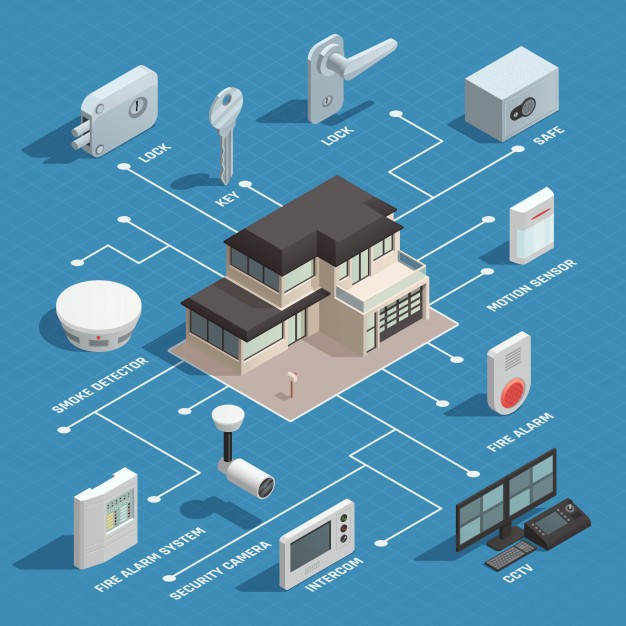
What is Home Automation?
Home automation is the residential extension of building automation. It is automation of the home, housework or household activity. Home automation may include centralized control of lighting, HVAC (heating, ventilation and air conditioning), appliances, security locks of gates and doors and other systems, to provide improved convenience, comfort, energy efficiency and security. Home automation for the elderly and disabled can provide increased quality of life for persons who might otherwise require caregivers or institutional care.
Benefits of Home Automation?

Home automation refers to the use of computer and information
technology to control home appliances and features (such as windows or lighting). Systems can range from simple remote control of lighting through to complex computer/micro-controller based networks with varying degrees of intelligence and automation. Home automation is adopted for reasons of ease, security and energy efficiency.
As the number of controllable devices in the home rises, interconnection and communication becomes a useful and desirable feature. For example, a furnace can send an alert message when it needs cleaning, or a refrigerator when it needs service. If no one is supposed to be home and the alarm system is set, the home automation system could call the owner, or the neighbors, or an emergency number if an intruder is detected.
Home automation can also provide a remote interface to home appliances or the automation system itself, to provide control and monitoring on a smartphone or web browser.

System Element
Elements of a home automation system include; sensors (such as temperature, daylight, or motion detection); controllers (such as a general-purpose personal computer or a dedicated automation controller); actuators, (such as motorized valves, light switches and motors); buses (wired or wireless); and interfaces (human-machine and / or machine-to-machine).
One or more human-machine and/or machine-to-machine, interface devices are required, so that the residents of the home can interact with the system for monitoring and control; this may be a specialized terminal or, increasingly, may be an application running on a smart phone or tablet computer. Devices may communicate over dedicated wiring, or over a wired network, or wirelessly using one or more protocols. Building automation networks developed for institutional or commercial buildings may be adapted to control in individual residences. A centralized controller can be used, or multiple intelligent devices can be distributed around the home.
How To Start a Home Automation Business?
As a startup home automation systems and service business owner, writing a quality business plan is one of the first tasks you need to address.
Now here’s the good news: You can minimize the amount of time it takes to write a business plan by buying business plan software. A reliable software solution will increase the accuracy and consistency of your business plan, dramatically improving its value to your home automation systems and service business.
Properly utilized, business plan software has the potential to transform your business plan from a throwaway business requirement to an integral strategic resource.
Don’t Ignore the Competition
Well in advance of opening a home automation systems and service business in your town, it’s a smart move to see how many competitors you have. Use the link below to generate a list of competitors in your area. Simply enter your city, state and zip code to get a list of home automation systems and service businesses in your town.
place.
Finding a Non-Competitive Business Mentor

If you want to open a home automation systems and service business it’s a wise move to have a conversation with someone who is in the business. It’s very unlikely that the local competition will talk to you. What’s in it for them?
However, an entrepreneur who owns a home automation systems and service business in a location that is not competitive to you will be much more likely to talk with you, provided that you won’t be directly competing with them. In fact, they are often very willing to share startup advice with you. Our estimate is that you may have to contact many business owners to find one who is willing to share his wisdom with you.
How does one quickly and easily locate an owner of a home automation systems and service business outside of your area who is willing to talk?
No problem! Just use the link below and try a random city/state or zipcode. Then start dialing for advice until you are successful.
Competitive Benefits of Buying a Home Automation Systems & Service Business
Pursuing a home automation systems and service business acquisition can be an effective route to profitability for emerging entrepreneurs.
A business acquisition also delivers an established brand – a big advantage in competitive markets. In fact, many entrepreneurs pursue acquisitions for the primary purpose of buying an established brand.
In a competitive market, the right acquisition can be leveraged to catapult your business into a market leadership position, even if you personally lack industry credentials.
Don’t Forget About Franchising As an Option
The odds of growing your business are much better if you decide to franchise in lieu of doing everything yourself.
Before you consider starting a home automation systems and service business, a smart move is to check out whether buying a franchise could help you avoid common entrepreneurial mistakes.
The link below gives you access to our franchise directory so you can see if there’s a franchise opportunity for you. You might even find something that points you in a completely different direction.
Cost

Costs mainly include equipment, components, furniture, and custom installation.
Ongoing costs include electricity to run the control systems, maintenance costs for the control and networking systems, including troubleshooting, and eventual cost of upgrading as standards change. Increased complexity may also increase maintenance costs for networked devices. Cloud-based services supporting an installation may also entail fees for setup, usage, or both.
Learning to use a complex system effectively may take significant time and training.
Control system security may be difficult and costly to maintain, especially if the control system extends beyond the home, for instance by wireless or by connection to the internet or other networks.
Home Automation Equipment Manufacturer
An engineered home automation system from Prestige Home Automation consists of high end components from many of our manufacturing partners. However, there are several manufacturers like Crestron or Vantage Controls that play a significant role in engineered systems and we believe it is important for you to know a little bit about them. Clicking on any of the manufacturer links below will take you to a links page where you can jump directly to the manufacturer’s own web site..
Crestron is the world’s leading manufacturer of advanced control and automation systems, innovating technology and reinventing the way people live and work.
Offering integrated solutions to control audio, video, computer, IP and environmental systems, Crestron Automation streamlines technology.
For over 20 years, Vantage Controls, Inc., headquartered in Orem, Utah, has designed and manufactured home automation and lighting control equipment.In a world of cookie cutter products, Triad Speakers,
inc. is the sole company designing and manufacturing a
comprehensive line of high-end architectural loudspeakers.
Market Overview

The home automation market is big business, growing over 30% a year and expected to be worth $9.5 (£6) billion worldwide in 2015, according to Berg Insight. In 2012 it remains an immature and fragmented market but one that is attracting the attention of major new suppliers such as multinational telecommunications enterprises.
Until recently the main opportunity for home automation appeared to be in new build, high-end homes. House building has been one of the casualties of the economic downturn, however, and this has accelerated the trend for a more pragmatic approach to home automation. Retrofitting systems is now an important market driver along with a real-world approach to costs.


